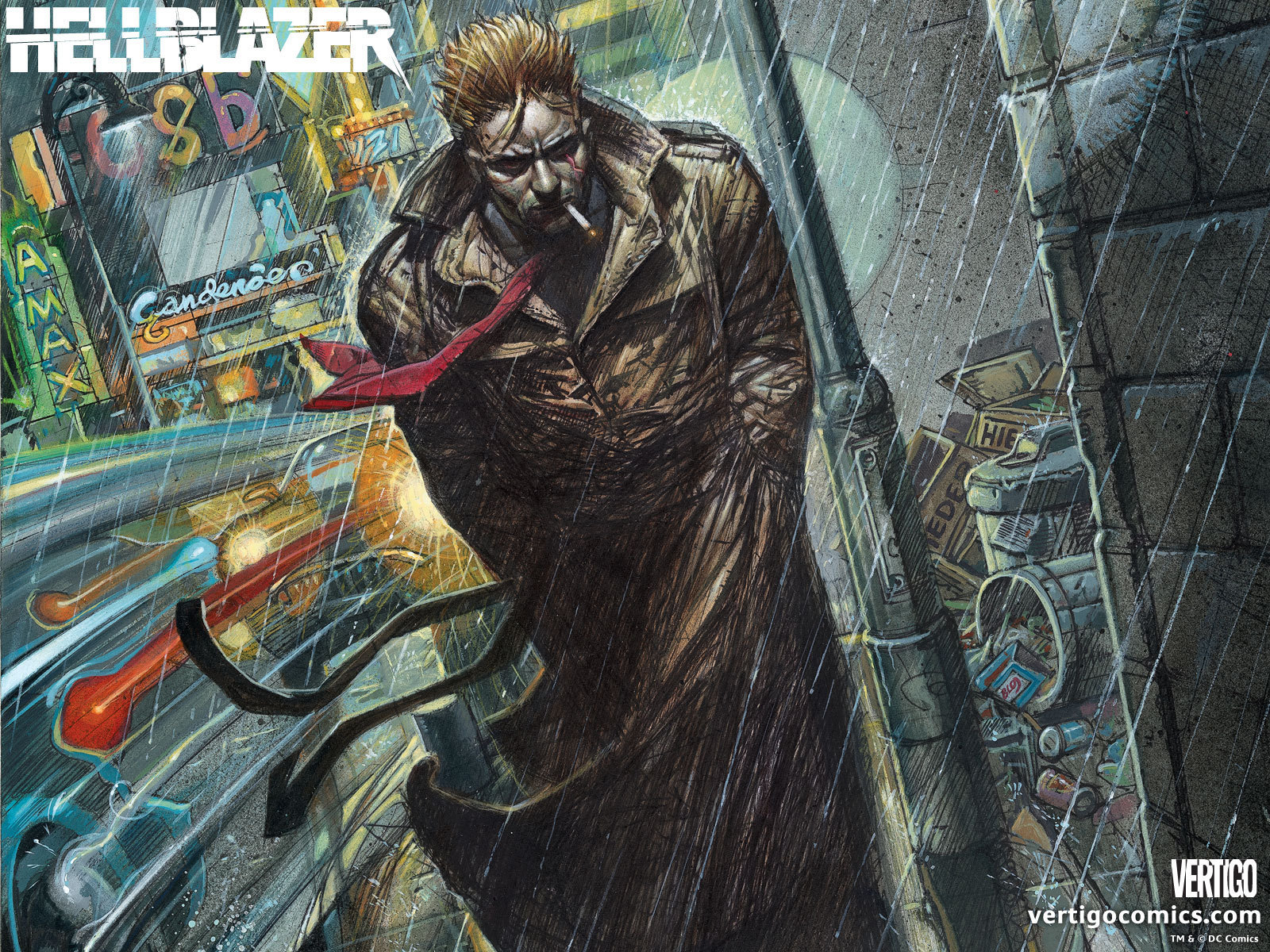I know, I know. A
bold statement. Especially given the
number of other shows that could equally make the case that they are, in fact,
as close as those of us in “The Colonies” will ever get to our own mad cap Gallifreyan
adventurer (The Middleman certainly
had a strong case to make). But here’s
the thing: all the main Doctor Who
tropes are present in the new NBC show.
Wise but possibly ambivalent hero fighting dark enemies? Check.
Companion who is mostly a rube but potentially possessing a vital power
or skill that the hero will need?
Yup. It’s-Bigger-On-The-Inside
base of operations? But of course.
All of which is not to suggest that Constantine is just some rip off.
If anything, having watched the first six episodes, I would argue that
the show is trying to establish itself as something wholly independent of the
rest of the comic book properties out there.
The mad Englishman with a special larger-than-it-seems home base and a
crazy encyclopedic knowledge of terrifying things coupled with a potentially
troublesome disregard for the people around him may echo our favorite fantasy
adventurer, but this is a TARDIS of a different shape.
A flame-ier, angrier TARDIS...
The Comic Book
Wait, what?
“Clovis,” I hear you say, “Is this yet another comic book TV show that
you can’t seem to stay away from?” Of
course it is. Constantine is based on the DC Comics book Hellblazer about John Constantine, a 35-year-old con man,
supernatural detective, and “petty dabbler of the dark arts” based in
London. But in order to understand this
character and where he fits in with all those flying cape-wearers who are
always saving the planet from alien invasions or some such, I’m going to have
to take you through a couple of very brief points of fact about the DC
Universe.
As always, those wishing to avoid the nerdy comic book
talk can skip ahead. I’ll let you know
when it’s safe to come back and hear just about the TV show.
The thing about DC Comics that separates it from the
other big comic book company, Marvel, is that DC has for years made a big show
about all its characters existing in a multiverse. (Marvel has a multiverse of its own, but a
much more consistent effort is put into place with their books to streamline
the characters and give them a common space to exist in.) This is the narrative device that allows DC
Comics to keep cannon a lot of completely out of date stories. It’s what explains, for example, how it is
that Wonder Woman can exist in our modern age and yet still have fought Nazis
during World War II. The Nazi-fighting version was a different reality Wonder
Woman from a different dimension in the multiverse. Comics, everybody!
I could keep explaining, but it's just going to make you want to do a lot of this.
In 1993, DC Comics created Vertigo, a specialty imprint
that would produce comics that were more adult; more like literature than the
flashy superhero adventures the company was primarily known for. Vertigo was
the home to Neil Gaiman’s Sandman
series, Alan Moore’s Swamp Thing and V for Vendetta, among lots of other
riskier and, frankly, weirder stories. Hellblazer was born into this world and
while John Constantine would sometimes still find ways to interact with the
occasional Superman or Batman, he mostly occupied a different reality in the
multiverse.
Constantine as a character was known for being rough
around the edges, unrelentingly cynical, and deadpan but also remarkably
cunning and capable of getting out of the toughest scrapes, a key skill when
the majority of your enemies are demons great and small, including the biggest
baddie of them all, The First of the Fallen.
(Read: The Devil. Sorta.) Writers at various times have portrayed him
as the ultimate pragmatist, willing to take anyone down if the ends justified
the means, but also as someone who is essentially motivated by a desire to be a
good person and make the world a better place. Of course, the world isn’t often saved by
people who are being nice guys. You can’t
make an omelet, etc. etc.
This actually qualifies as a light-hearted moment for most of Constantine's life.
The TV Show
Okay comic-phobes, you can come back! The good news for traditionalist is that the
TV series did a
phenomenal job
casting John Constantine. Seriously, you
guys. Matt Ryan looks exactly like how
his character is supposed to. I know
that may seem like a small thing, but in this age of
whitewashing
and making changes because somehow the source material isn’t “relatable”,
seeing Matt Ryan in his Constantine trench coat and loosened tie for the first
time made a lot of folk feel like this show was on target.
Seriously, you guys. Nerd-squee.
And then there was Liv…
The first episode serves up similar story notes from the
comic books. Constantine has voluntarily
confined himself to an English psychiatric hospital after botching an exorcism
that resulted in a young girl, Astra, being dragged into Hell. His rest cure
fails to work, however, when a cadre of supernatural forces warn John that Liv
Aberdine, an American woman who is also the daughter of one of John’s old magic
partners, is in danger. John manages to
exorcise the demon that is chasing down Liv, but the experience is too much for
her and she flees his company after providing him a scrying map showing John
other locations throughout the country where something evil is afoot.
And therein was the first problem for the new
series. Simply put, Liv shouldn’t have. The part didn’t mesh with the story; there
wasn’t a lot of there there and the actress was replaced with a new character,
Zed who shares some of Liv’s psychic abilities but is a bit more
world-weary. Fans worried that the
abrupt change in lead casting was a bad portent for the show. Personally, I think John and Zed make a
better pairing precisely because Zed has her share of secrets she’s keeping
from John. Plus it underlines a very
major point in the comics: John isn’t a good person to be around. He’s trouble and he’s not afraid to put you
in between himself and it. John
acknowledges this to his only other compatriot, Chas, a man who is loyal to
John but has the mysterious ability to survive being killed making him one of
the only people who can probably stand to be around John for long. Add to that the host of angels who are rapidly losing patience with John and not so squeamish about maybe handing him over to the demons who would love to have his head and Constantine's got a lot of motivation for screwing over otherwise fine people.

Pictured (l to r): Angel, Hero Jerk Face, Woman of Mystery, Undead Cab Driver (really).
Aside from the casting drama, there’s a lot to find in Constantine for folks looking for some
light horror. Storylines are taken from
the comics, so fans will find plenty to wink at. (See below for more on that.) At the same time, the show manages to keep
exactly the right tone in relation to the demons and ghosts that make their way
into Constantine’s life. He’s not afraid
of them, exactly; but he does take them seriously. His deadpan humor is fully imported from the
comics, but Matt Ryan gives his lines a gravity that shows just how unsure of
himself Constantine is in the wake of that failed exorcism. Most importantly, the show has been very
careful about keeping the sanctity (pun not intended) of their main character
in tact: John’s defining character trait in the comics is that he smokes. This is a problem for network TV where
characters aren’t allowed to smoke given network standards and practices. As such, we’re given just enough subtle clues
to suggest that John has just put out a cigarette that observers will
understand how much this is a part of his character. Likewise, the punk-rock sensibility from the
comics is still on display. In a scene
where John must fight a demon without listening to its voice, he blasts The
Clash on his iPod to drown out the sounds.
As a side note, between this and their other horror show,
the incredible Hannibal, NBC seems to
be interested in carving out a horror niche that I’m very much in favor
of. Both shows take significant risks
for network television and it’s exciting to see these stories being played
out. Unless you’re Maggie Cats, after
all, you can only watch so much Law &
Order before you need something else on TV.
The Easter Eggs
As with
Gotham
and
The Flash, DC Entertainment has
again dropped a number of Easter Eggs for fans.
Many of them are more overt than other DC shows; John openly talks about
Mucus Membrane, his former punk band. In
the pilot, Liv picks up a golden helmet before John warns her to put it back
down, saying more than likely it will wear her before she could wear it. The helmet is an exact copy of that worn by
the character
Dr. Fate. In episode five, John and Zed work with New
Orleans cop Jim Corrigan. Near the end
of the episode, Zed has a disturbing vision of Corrigan dead and bleeding but
with a green light emanating from him.
Savvy viewers will know that Corrigan will eventually die and become
The Spectre, a
character who is the spirit of vengeance.
Other references are far more subtle. In John’s Bigger-On-The-Inside base camp
filled with magical items, you can see Pandora’s Box in one glass case. Not far from it, there’s backwards writing on
a chalkboard, a clear reference to the comic book character
Zatanna who recites phrases
backwards in order to cast magic spells. One of John’s former associates now works at
Ivy University, a school often referenced in DC Comics and home to several
other superheroes. A close-up shot of
Constantine’s business card gives an Atlanta-area phone number. Call that number and you’ll get a recording
of Matt Ryan as Constantine referencing someone named
Alec Holland.
The Bottom Line
You know what I’m going to say here – watch this damn
show. Yes, that’s because it’s a comic
book character and I’m firmly in the camp of believing that if comic book
properties continue to be successful, they’ll stop becoming a special niche and
will instead become a genre. We’ve made
great strides on this so far – Constantine
stands on its own as a horror show; Gotham
is doing a capable job as a police procedural; Agents of SHIELD, despite the slow start, has been doing reasonably
well as a spy drama; the success of the Marvel cinematic universe all together
has show that comic book characters don’t just have to be caped adventure
stories with one-note plots. Progress is
being made.
As of now, Constantine
is slated to run for 13 episodes in its first season. It hasn’t been called up for more episodes or
for a second season, though NBC and DC have both indicated that doesn’t mean
the show will be cancelled. For my
money, the risks taken on bringing a show like this to television alone are
worthy of supporting it, but I honestly think new viewers will be intrigued by
the complexity of the characters and the gradual deepening of the storylines.
Also, repeat after me: the movie never happened. The movie. NEVER. HAPPENED.
Oh go be sad about it in a park, Keanu.

















